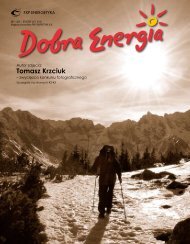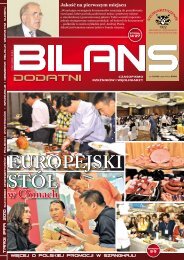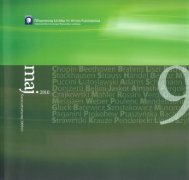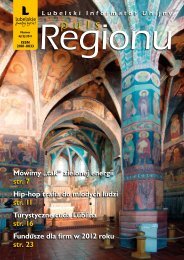Sense of Beauty - Agape
Sense of Beauty - Agape
Sense of Beauty - Agape
- No tags were found...
Create successful ePaper yourself
Turn your PDF publications into a flip-book with our unique Google optimized e-Paper software.
hotele spa/spa hotelstyna, wyczucie i pomysły rodzą sięsame. Inspiruje mnie wszystko, codziała na zmysły, literatura, kino,teatr. Kucharz, który myśli tylkoo gotowaniu, w pewnym momenciesię wypala, przestaje byćtwórczy. Trzeba umieć się zdystansować,to się udaje, kiedyoprócz kuchni ma się też innezainteresowania.Jest Pan entuzjastą kuchni molekularnej.Co Pana w niej fascynuje?Przetwarzanie klasycznych potrawna nowoczesne. Wykorzystywanieskładników w różny sposób,obserwowanie, co się z nimi dziejena przykład podczas obróbki termicznej,mrożenia. Interesującejest opracowywnie nowatorskichtechnik, ale też tworzenie nowychtekstur, zastanawianie sięnad produktem, co mogę z niegozrobić, jak inaczej mogę go wykorzystać,czy szparagi mogępodać tylko w tradycyjnej wersji,a może mogę zrobić z nich musalbo piankę. Wszystko to jednaktylko sztuczki kulinarne, najważniejszyjest efekt końcowy, czylismak i jego esencja.Jaką kuchnię poleci Pan na lato czytelnikom<strong>Sense</strong> <strong>of</strong> <strong>Beauty</strong>? Lato tonajlepszy czas na wykorzystanieświeżych produktów. Najlepszebędzie to, co daje nam ziemia,las. Letnia kuchnia powinna byćlekka. Lubię używać dużo dobrejoliwy, do niej różnego rodzaju sałaty,sezonowe warzywa, świeżeowoce. Zapraszam wszystkich dowypróbowania moich przepisów.Ulubione danie Michała Mamorskiego?Nie ma takiego. Kiedy jadę do domulubię mielone kotlety z mizerią iziemniakami przyrządzone przezmoją mamę. Kiedy idę do restauracji,zawsze zamawiam to, czegonie znam. Lubię próbować. Kucharzmusi być otwarty na wszystkiesmaki.How do you like your newhome? The Dylewo Hillsare beautiful! I paid avisit to the place backbefore I became head chef, andI liked it then as well. Everythinghere is conducive to relaxation:the lakes, the forests… Spendingtime out in nature always has abeneficial effect on me. It helpsme relax and get rid <strong>of</strong> stress. Idecided to move here, although Iadmit I kind <strong>of</strong> miss the city. It’sso calm and quiet out here, andI’m accustomed to a fast urbanlifestyle.Have you introduced any changes inthe kitchen? Changes have to bemade gradually. My changes willlargely involve simplification. Ithink it helps improve the quality<strong>of</strong> the food. For example, justbecause a dish is made with teningredients doesn’t necessarilymean it’s good. I want to reducethe aesthetics in a similar fashion.I’m <strong>of</strong> the opinion that decorationshould be conducted through subtraction.The restaurant we’re innow (“Romantyczna”) is focusedon slow food and uses local ingredients.That’s something I want tocontinue in Oranżeria restaurantafter my precursor. A “back to nature”approach is very appropriatefor this place. I’ve already changeda few things, though. For example,I’ve replaced the buffet with anà la carte menu, which I think isthe right solution for a place aselegant as this.You’ve cooked in many places aroundthe world. Where did you enjoyworking the most? I was born inGdynia. At the age <strong>of</strong> thirteen, myparents and I moved to the Netherlands,where I’ve spent most<strong>of</strong> my life. I did in fact travel quitea bit before returning to Poland. Ispent a total <strong>of</strong> six years living inSpain, Switzerland, and Africa. Ican’t say where I enjoyed workingthe most. It’s not the country thatmatters. I met lots <strong>of</strong> fantasticpeople everywhere I went, andthat’s what really counts. As faras national cuisines go, I foundSpanish food to be the most tomy liking. It’s a very modern andincredibly experimental cuisine. Ilearned a lot there. Polish cuisineis more traditional, and doesn’tborrow much from other countries,although that’s starting tochange.How did your career start? I’ve beencooking for 28 years. I had to goup all the steps before becoming acook. I started out washing dishesat a Dutch restaurant that servedaround 1,500 people every day. Itwas a grueling job. It lasted threeyears, during which I observed thecooks at work, learning their trade.After all, I wanted to be a cooktoo, and a good one at that. Bythe time I left for Spain, I was amature man and I was convincedthat I was a good cook as well. Asit turned out, Spain had a lot toteach me. Spanish cuisine is veryopen to novelties. For example,while in Poland we only add dillto potatoes or fish, over there itcan be used to make an excellentdesert. No one would have evercome up with something like thatin Poland.Are you also looking to introducethat type <strong>of</strong> modern cuisine atthe Dylewo Hills? I would like itvery much if we could start thinkingoutside the box. I’m going totry, anyway. But besides moderncuisine, there’s also modern management:the head chef has tobe a good manager. I’m going torule my kitchen with a “s<strong>of</strong>t” fist.I want my cooks to enjoy comingin to work, and I want them tobe co-creators <strong>of</strong> the place. I’llbe glad to share with them theculinary secrets I’ve learned. Themost important one is that thereis only one taste: the head chef’s,meaning mine. They know that.I’m open to their ideas, but there’sno democracy in the kitchen; it’s adictatorship ruled by my taste.Where do you find inspiration for yourdishes? I start with books. I stilllike good cookbooks, and I watchothers cook, too. But with time,you fall into a routine, gain a certainintuition for cooking, and theideas just appear by themselves.I’m inspired by everything thataffects the senses: literature, cinema,theater. A cook that onlythinks about cooking is eventuallygoing to burn out, he’ll losehis creative sense. You have tobe able to take a step back, andthat works when you have otherinterests beside cooking.You’re a molecular gastronomy enthusiast.What is it about that artthat fascinates you? The transformation<strong>of</strong> classic dishes intomodern food. Using ingredients ina variety <strong>of</strong> ways, observing whathappens to them when you heat orfreeze them. Developing new innovativetechniques is interesting,but so is creating new texturesand thinking about ingredientsin new ways: what can I make out<strong>of</strong> it, what else can I do with it? Isthe traditional way the only wayto serve asparagus, or can I turn itinto a mousse or a foam? But all<strong>of</strong> this is just culinary gimmickry,what really counts is the end result,meaning the taste and theessence.What types <strong>of</strong> dishes would recommendto the readers <strong>of</strong> <strong>Sense</strong> <strong>of</strong><strong>Beauty</strong> this summer? The summeris a great time to take advantage<strong>of</strong> fresh produce. Ingredientsthat come from the earth and theforest are best. Summer dishesshould be light. I like to use a lot<strong>of</strong> olive oil, mixed with a variety <strong>of</strong>salads, seasonal vegetables, andfresh fruit. I encourage everyoneto try out my recipes.What’s Michał Mamorski’s favoritedish? I don’t have one. WheneverI go home, I like to have meatballs,cucumbers with cream,and potatoes, the way my mothermakes them. Whenever I go to arestaurant, I order something I’mnot familiar with. A chef has to beopen to all tastes.76 sense <strong>of</strong> beauty lato/summer 2011 magazyn Dr Irena Eris77











